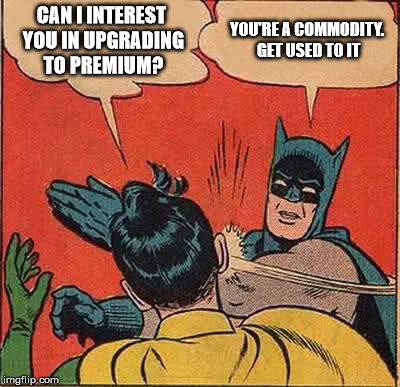Most of the time, my response to someone trying to up-sell me the "premium" version is:

Everyone wants to be a premium brand, because they've heard that brands are valuable, and they don't really understand how that works so it looks like it's a way of getting free money, and they try to position themselves as "premium" and are baffled when no one cares. Almost all the time, "ordinary powder" is good enough.
Maybe I'm unusual, but what I put a premium on is my time and my convenience - not your advertising spend and your brand positioning. Dave mentions the infamous $16 beer and so here's a little experiment I'd like to propose:
Instead of having a bar that charges $12 for Bud (seriously what the actual fuck?) and $16 for a premium Blue Point Toasted Lager, have a bar that is very clearly split into two, with servers working either one half or the other. On one half of the bar, you sell all your beer for $12, and you have a big signpost to that effect. On the other half, you sell the SAME EXACT BEER for $16, and you have a big sign up saying that, too. (If you're talking about $12 or $16 per can the costs of the actual beer is obviously such a tiny proportion of the amount the buyer pays it's frankly irrelevant whether the beers have slightly different cost prices).
Obviously, people will buy beer from the $12 half. The staff working the $16 half will have very little to do. But at some point, the $12 half is going to get really crowded. There's going to be a long queue. And then someone's going to say "It's worth $4 to me to get my beer NOW and not have to wait for 20 minutes. I want to get back to my seat!". And some people are going to self select to the expensive half, because they're happy to pay the premium to not have to wait.
Now, I like beer, and these numbers seem mental to me. There's no way that any can of beer ever would be worth $16 to me, and I'd rather drink a bottle of piss than a Budweiser. But paying an amount that is massively over the odds to get the beer that isn't horrible would stick in my throat. I wouldn't enjoy it, and I would have a lot of negative feelings towards the people who organised the event. If you give me a choice between $12 piss or $16 drinkable beer, then I will resent you. Whereas if my choice is $12 beer with a queue, or $16 beer without a queue, then I'll think about it. Some times I'll queue, and sometimes I'll value my time more, and if I choose to pay $16 then that's my business and I don't hate you for it any more.
So, tickets. What's this got to do with tickets?
We're all familiar with seating plans with multiple price bands, and in no way am I suggesting that that is a bad idea.
The mistake is to think that "having better sight lines" is the premium for which people are paying. I would suggest that the real value of the premium seat is that they're still available when all the other seats are sold out. There's less competition for them. They're likely to be less crowded. And most importantly - and this is purest snobbery and I'm not saying I agree with it, I just don't think it serves anyone to ignore it - the biggest premium is not having to sit next to a poor person. If you're in the most expensive seats in the house, the chances of having a teenager eating popcorn and physically incapable of turning off their phone as your next door neighbour are much lower.
Those premium benefits - real benefits that people are happy to pay for - are not because the seats are better. They're because the seats are more expensive. They're not in spite of the differential pricing: they are because of the differential pricing. If you have any customers you think are rich enough to value these benefits, you should probably take some of your existing seats and call them "premium". If they don't sell, put them back to normal, and if they do, it's free money.